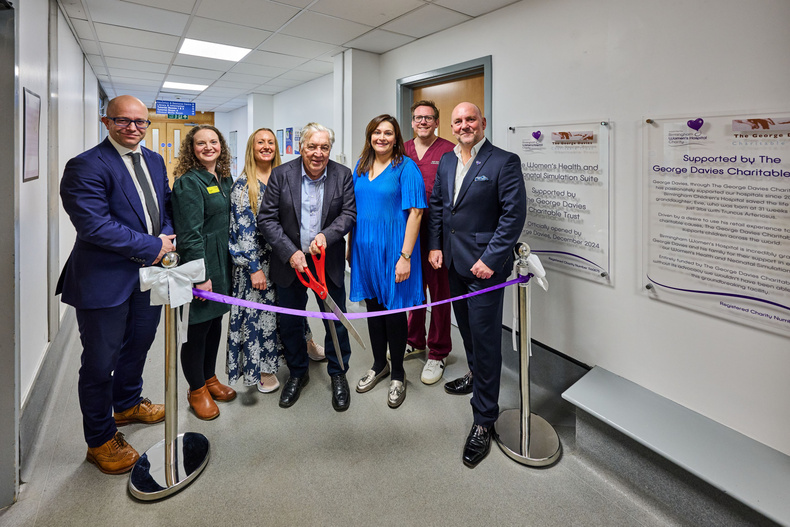£1m donation funds NHS’s first simulation suite dedicated to maternal and neonatal health

Birmingham Women’s Hospital is now home to the NHS’s first simulation suite dedicated to maternal and neonatal health, thanks to a £1million donation from high street fashion entrepreneur George Davies.
The new state-of-the-art simulation lab has revolutionised the training of maternity and neonatal teams at the Women’s Hospital, part of Birmingham Women’s and Children’s NHS Foundation Trust, as well as hospitals across the region, offering the opportunity to learn and train in a risk-free environment.
Installed with the latest technology, the suite is split into four dedicated areas all kitted out as though they are ‘real-life’ working wards and departments, including a maternity delivery simulation room, a neonatal unit, as well as a gynaecology and theatre simulation room.
There is also a seminar and training room, plus a debrief area, which provides participants an opportunity to seek feedback, review and learn in a supportive and constructive way.
Thanks to projector technology, colleagues can now live-simulate various environments, including a home birth scenario, the arrival at delivery suite in the back of an ambulance as well as a typical delivery suite and ward environment.
As the space offers more than one room, multiple teams can be trained at the same time, for example a baby being born in car park, then being moved – together with mum – to the delivery suite, followed by the baby being moved to the hospital’s Neonatal Intensive Care Unit.
The use of simulation training is advocated by NHS England as one of the most successful education enablers, equipping learners with hands-on experience of what they are expected to do, act upon, escalate and in some cases inform decision-making as a practitioner.
The Ockenden Report – an independent review of maternity services – advised ‘staff who work together must train together’.
It also identified having a ‘well-trained workforce’ as one of its four key pillars of essential action. The introduction of the simulation lab further strengthens the ability of Birmingham Women’s Hospital to live by those principles.
Historically, colleagues had to either complete their training in meeting rooms which didn’t provide a life-like experience, in bedspaces which may need to be used by patients or rely on external simulation sites which took colleagues out of the hospital and didn’t always meet the specific training needs of the maternity and neonatal teams.
Matt Nash, consultant neonatologist and clinical director for Maternity and Neonates at Birmingham Women’s Hospital, said: “We’re blown away by the new simulation lab and the generosity of Mr Davies’ charitable trust.
“It’s a game-changer for us, as no other simulation lab provides this level of fidelity or realism in a maternity and neonatal setting.”
George Davies, who made the donation via the George Davies Charitable Trust, said: “The George Davies Charitable Trust was created to support children in many parts of the world.
“That includes patients at Birmingham Women’s and Children’s Hospitals, who I first started supporting in 2006, after the hospital saved the life of my granddaughter, Evie, who was born with Truncus Arteriosus, a rare congenital heart defect.
“18 years on, as Evie has just started university, I’m delighted to once again be supporting the Trust and its new simulation lab.”
Mark Brider, chief executive of Birmingham Women’s Hospital Charity, said: “This £1m gift is transformational for our hospital.
“Without the vision of our hospital teams, and the backing of the George Davies Charitable Trust, our new simulation lab wouldn’t have been possible. We’re so very grateful.”
Pictured: From left - Matt Boazman (CEO of Birmingham Women’s and Children’s NHS Foundation Trust), Hannah Coakley and Catherine Powell, from the Trust, George Davies, Kiren Ghag, from the Trust, Matt Nash and Mark Brider
